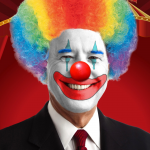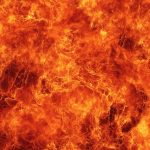Wed Dec 16, 2020 Jack Kerwick64
2020: The Age of UnReason, the Year of Fear.
Shortly after word reached England that the Spanish Armada had embarked, the philosopher Thomas Hobbes, born in 1588, tells us that the terror induced in his mother labor pains that resulted in his premature birth. He memorably remarked that “fear and I were born twins together.”
Hobbes’ words will doubtless resonate in spades with anyone who was born in 2020.
The present year is the Year of Fear. It is the year of raw, wildly irrational fear.
For sure, the inexhaustible fear-mongering on the part of opportunistic political partisans in the Government-Media-Industrial-Complex has exacerbated, exponentially exacerbated, the fears of tens and tens of millions of Americans. Yet the elites have not, strictly speaking, caused this fear.
They have only revealed it for all of the world to see.
To put this in terms with which most of us have long been familiar, the transformation of a cold virus into an existential crisis legitimizing the indefinite revocation of the United States Constitution and the reduction of the Land of the Free to an internment camp—and one in which its prisoners seem only all too happy to observe “Social Distancing” protocols while cowering behind their masks—has proven beyond the shadow of a doubt that most people really are ridden with fear.
Fear is universal. It is at once necessary and desirable—as long as it is oriented toward objects that warrant its attention.
In other words, when the fear is reasonable, when it is proportionate to the danger posed, it is fulfilling its natural function.
And, as Aristotle long ago observed in his famous analysis of fear and courage, a person who habitually “fears the right thing, for the right motive, in the right way and at the right times” is a courageous person.
Courage or bravery is a virtue, an excellence of character. Aristotle said of it that it “is the first of human qualities because it is the quality which guarantees the others,” “the greatest quality of the mind next to honor.”
Courage is “the mean” between the emotional extremes of “excess” and “deficiency.” Fear is a morally-neutral emotion in itself. When, though, a person habitually possesses an excess of fear—when he possesses more fear than he ought to possess—he has the vice of cowardice. On the other hand, when a person habitually suffers a deficiency of fear—when he possesses less fear than he ought to possess—he has the vice of recklessness.
Both an excess and a deficiency of fear are simply irrational or unreasonable amounts of fear. The irrationality of the fear is determined by the nature of the object of the fear.
Similarly, courage is the virtue that obtains when a person strikes upon the mean between excess and deficiency. To be courageous is to fear reasonably, to know what to fear, when to fear it, and how to do so.
Assuming for the moment (against the evidence to the contrary) that COVID-19 truly is a distinct virus that has been isolated from the gazillions of other stuff with which it co-exists in the bio-chemical soup in which scientists claim to have located it, even according to the official numbers (which even the CDC acknowledges is the result of inflating the death-by-COVID toll by some 94%), the dreaded Virus has a mortality rate in the United States of about one-tenth of one percent—about that of the seasonal flu (The real mortality rate is appreciably smaller than even this, for if only six percent of patients to have died from COVID, lacking any pre-existing conditions, actually died from COVID, then this amounts to about 15,000 people. This in turn means that for people who are not immunocompromised, COVID in the United States has a mortality rate of about five one thousandths of one-percent!).
Since the overwhelming majority of people to have died from “The Virus” suffered from multiple pre-existing conditions, they didn’t die from this virus at all; they died with it, perhaps, but not from it. The proof for this is that much stronger in light of a recent John Hopkins University study that was retracted within hours of having been published—despite the fact that, to the admission of those who retracted it, there wasn’t a syllable of it that was inaccurate.
Rather, the retraction was made on the grounds that it could be “misinterpreted” or otherwise used for the nefarious purpose of disseminating “misinformation” regarding COVID.
The study, which was performed by the university’s students, found that the number of overall deaths in 2020 remained continuous with that of years past. This revelation came as a shock as the authors expected that deaths would be significantly higher given that this year, unlike in the past, COVID deaths would add to the total death toll. So the researchers delved more deeply and discovered that, incredibly—miraculously—deaths in all other categories, in the categories of heart disease, respiratory illness, pneumonia, influenza, etc., decreased just as COVID deaths increased.
The explanation for this became at once self-evident: deaths in all of these other categories were being counted as COVID deaths (the paper can still be found in a PDF file).
The point here, though, is that the millions of American citizens who have radically upended their lives (and the life of the whole society) due to their fear of contracting a virus with a mortality rate no different from that of seasonal influenza and from which most people who contract it don’t even get sick are consumed by an excess of fear. The irrationality of their fear is staggering.
A reader recently brought to my attention an article that C.S. Lewis had written on the panic over the prospect of an atomic bomb attack that had seized the members of his generation. Lewis’s contemporaries at least had something truly dangerous to fear, for an atomic bomb, being an indiscriminate killer, was certain to leave in its wake widespread destruction and death. Nothing remotely similar can be said for COVID. Still, it is worth revisiting Lewis’s sagacious counsel, as his words resonate, or should resonate, more profoundly for those of us living today than perhaps at any other time within recent memory.
In “On Living in an Atomic Age,” Lewis shares how he is “tempted to reply” to those who question how life should proceed under the constant threat of nuclear attack. “’Why, as you would have lived in the sixteenth century when the plague visited London almost every year, or as you would have lived in a Viking age when raiders from Scandinavia might land and cut your throat at night; or indeed, as you are already living in an age of cancer, an age of syphilis, an age of paralysis, an age of air raids, an age of railway accidents, an age of motor accident.’”
Lewis elaborates, warning against the loss of perspective that arises “by exaggerating the novelty of our situation.” Death was “a certainty” long before the invention of the atomic bomb. What “the scientists” have done is simply add “one more chance of painful and premature death to a world which already bristled with such chances [.]”
This being the case, if and when it comes, “let that bomb…find us doing sensible and human things—praying, working, teaching, reading, listening to music, bathing the children, playing tennis, chatting to our friends over a pint and a game of darts,” and “not huddled together like frightened sheep and thinking about bombs. They may break our bodies…but they need not dominate our minds [.]”
Lewis concludes with a warning that all of us in the “COVID era” should take to heart:
“Nothing is more likely to destroy a species or a nation than a determination to survive at all costs.”
Source: https://www.frontpagemag.com/fpm/2020/12/courage-vs-covid-jack-kerwick/










More Stories
Editorial: Brandon Johnson’s statement on Loop violence was as revealing as it was lamentable
San Francisco Falls Into The Abyss
‘Doomsday clock’: 90 seconds to midnight